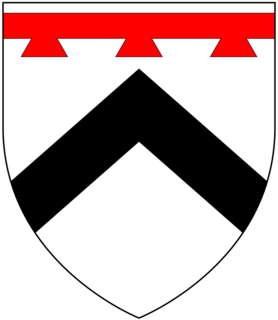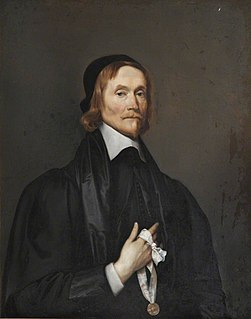
Richard Middleton (died 1641) was a Church of England clergyman and writer who served as Archdeacon of Cardigan and chaplain to Charles, Prince of Wales (later King Charles I).

Richard Middleton (died 1641) was a Church of England clergyman and writer who served as Archdeacon of Cardigan and chaplain to Charles, Prince of Wales (later King Charles I).

Middleton obtained a BA degree from Jesus College, Oxford in 1586. [1] He was ordained and became vicar of Llanarthne, Carmarthenshire in south Wales, and then in 1589 obtained two posts in the diocese of St David's: prebend of Brecon and archdeacon of Cardigan. (He may have been the son of Marmaduke Middleton, Bishop of St Davids, who died in 1593.) He also served as vicar of Tenby from 1617 to 1624. He was nominated to become vicar of Leeds in 1614, which caused considerable dispute since there was another candidate backed by leading parishioners and by Tobias Matthew, the Archbishop of York. The Court of Chancery ruled against Middleton. He had, meanwhile, been appointed chaplain to Charles, Prince of Wales (later King Charles I). He wrote The Carde and Compasse of Life in 1613, a manual of advice to the prince. A later work, The Heavenly Progresse (1617) contained further advice to Charles that a good prince was not above the law, using quotations from classical authors to justify his reasoning. His other works included The Key of David (1619) and Goodness the Blessed Man's Badge (1619). [2]
He remained Archdeacon of Cardigan in 1629 when he exchanged positions with William Parker to become rector of Ecton, Northamptonshire – a well-rewarded position. His wife, Margaret, was buried in Ecton in 1635; there is nothing to show that they had children. He died on 16 November 1641, and was also buried in Ecton. [2]

Henry Hammond was an English churchman, who supported the Royalist cause during the English Civil War.

John Colepeper, 1st Baron Culpeper of Thoresway was an English royalist landowner, military adviser and politician who, as Chancellor of the Exchequer (1642-43) and Master of the Rolls (1643) was an influential counsellor of King Charles I during the English Civil War, who rewarded him with a peerage and some landholdings in Virginia. During the Commonwealth he lived abroad in Europe, where he continued to act as a servant, advisor and supporter of King Charles II in exile. Having taken part in the Prince's escape into exile in 1646, Colepeper accompanied Charles in his triumphant return to England in May 1660, but died only two months later.

John Williams was a Welsh clergyman and political advisor to King James I. He served as Bishop of Lincoln 1621–1641, Lord Keeper of the Great Seal 1621–1625, and Archbishop of York 1641–1646. He was the last bishop to serve as lord chancellor.

Peter Mews was an English Royalist theologian and bishop. He was a captain captured at Naseby and he later had discussions in Scotland for the Royalist cause. Later made a Bishop he would report on non-conformist families.
Richard Montagu was an English cleric and prelate.
Richard Smith, . Having studied at the English College in Rome, he taught at Valladolid and Seville. He succeeded William Bishop, as the second Catholic Vicar apostolic for England, Wales and Scotland.
Robert Wilmer Woods,, known as Robin Woods, was an English Anglican bishop. He was the Bishop of Worcester from 1971 to 1982. He previously served as Archdeacon of Sheffield from 1958 to 1962, and as Dean of Windsor from 1962 to 1970.

John Prideaux was an English academic and Bishop of Worcester.
Thomas Howell (1588–1650) was a Welsh clergyman who was the Bishop of Bristol from 1644 to 1646.
William Thomas was a Welsh Anglican bishop. He was ejected from his living at Laugharne during the English Civil War. He was restored in 1660 and became the Bishop of St David's and later the Bishop of Worcester.
James Fleetwood was an English clergyman and Bishop of Worcester.
David Powel was a Welsh Church of England clergyman and historian who published the first printed history of Wales in 1584.
William Wroth (1576–1641), a minister of the Church of England, is generally credited with the establishment of the first Independent Church in Wales in 1639. From 1617 until 1639 Wroth was Rector of the parish church at Llanvaches in Monmouthshire where his Congregationalist chapel was founded.
Laurence Womock (1612–1686) was an English bishop. He is best known for his controversial writings, some of which were signed Tilenus, after Daniel Tilenus, expressing his hostility to Calvinism in general, and the Synod of Dort in particular.
Walter Balcanquhall was a Scottish clergyman who became a staunch royalist and supporter of the church policy of Charles I of England. He was chosen by James I as a delegate from the Church of Scotland to the Synod of Dort.
William Barlow or Barlowe was a Welsh churchman and scientist.

Richard Steward or Stewart was an English royalist churchman, clerk of the closet to Charles I and designated Dean of St. Paul's and Westminster, though not able to take up his position because of the wartime circumstances.

Sir Charles Cornwallis was an English courtier and diplomat.
David Lloyd was a Welsh clergyman, and was the author of a ballad The Legend of Captain Jones.
Cutts Barton, (1706–1780) D.D. was an English cleric, Dean of Bristol from 1763 to 1780.